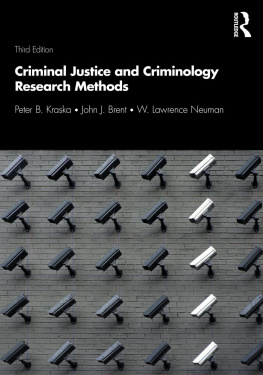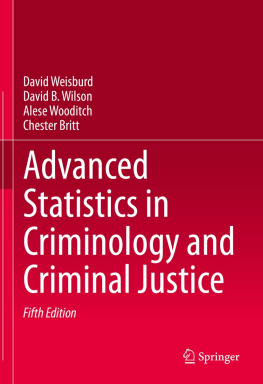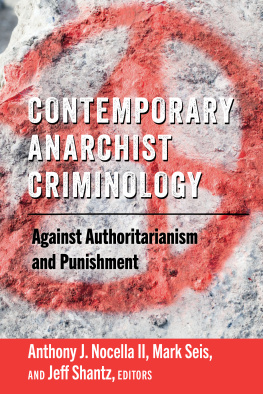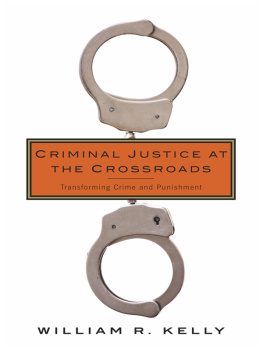Criminal Justice and Criminology Research Methods
Criminal Justice and Criminology Research Methods, Third Edition, is an accessible and engaging text that offers balanced coverage of a full range of contemporary research methods.
Filled with gritty criminal justice and criminology examples including policing, corrections, evaluation research, forensics, feminist studies, juvenile justice, crime theory, and criminal justice theory, this new edition demonstrates how research is relevant to the field and what tools are needed to actually conduct that research. Kraska, Brent, and Neuman write in a pedagogically friendly style yet without sacrificing rigor, offering balanced coverage of qualitative, quantitative, and mixed methods. With its exploration of the thinking behind science and its cutting-edge content, the text goes beyond the nuts and bolts to teach students how to competently critique as well as create research-based knowledge.
This book is suitable for undergraduate and early graduate students in US and global Criminology, Criminal Justice, and Justice Studies programs, as well as for senior scholars concerned with incorporating the latest mixed-methods approaches into their research.
Peter B. Kraska, Ph.D. is a professor in the School of Justice Studies at Eastern Kentucky University. He has distinguished himself as a leading scholar in the areas of police and criminal justice militarization, criminal justice theory, and mixed-methods research. He has published seven books including Criminal Justice and Criminology Research Methods, Theorizing Criminal Justice: Eight Essential Orientations, and Militarizing The American Criminal Justice System: The Changing Roles of the Armed Forces and Police. Dr. Kraskas research has also been published in a number of leading journals, including the British Journal of Criminology, Social Problems, Justice Quarterly, and Policing and Society. Dr. Kraskas work has received national and international recognition. He is frequently asked to present his research and findings to academic and policy audiences, including most recently testifying for the US Senate on police militarization. His work has also been featured in media outlets such as 60 Minutes, The Economist, Washington Post, BBC, New York Times, Wall Street Journal, Huffington Post, National Public Radio, and PBS News Hour.
John J. Brent, Ph.D. is an Assistant Professor in the School of Justice Studies at Eastern Kentucky University. He holds a Ph.D. in Criminology from the University of Delaware. His interests focus on: the cultural and structural dynamics of crime and crime-control; how institutions create and perpetuate inequalities; building a theoretical foundation for criminal justice theory; and how individuals are disciplined and punished.
W. Lawrence Neuman, Ph.D. is a Professor Emeritus of Sociology at the University of Wisconsin, Whitewater. He has authored a number of methodological textbooks and published articles in leading academic journals covering a host of social, political, international, and cultural issues. His work has attracted funding from various grants, leading him to being awarded the Outstanding Researcher Award at his institution and earning him the University of Wisconsin-System Teaching Fellow Award.
Criminal Justice and Criminology Research Methods
Third Edition
Peter B. Kraska
John J. Brent
W. Lawrence Neuman
Third edition published 2021
by Routledge
52 Vanderbilt Avenue, New York, NY 10017
and by Routledge
2 Park Square, Milton Park, Abingdon, Oxon, OX14 4RN
Routledge is an imprint of the Taylor & Francis Group, an informa business
2021 Taylor & Francis
The right of Peter B. Kraska, John J. Brent, W. Lawrence Neuman to be identified as authors of this work has been asserted by them in accordance with sections 77 and 78 of the Copyright, Designs and Patents Act 1988.
All rights reserved. No part of this book may be reprinted or reproduced or utilised in any form or by any electronic, mechanical, or other means, now known or hereafter invented, including photocopying and recording, or in any information storage or retrieval system, without permission in writing from the publishers.
Trademark notice: Product or corporate names may be trademarks or registered trademarks, and are used only for identification and explanation without intent to infringe.
First edition published by Pearson 2007
Second edition published by Pearson 2011
Library of Congress Cataloging-in-Publication Data
Names: Kraska, Peter B., 1961 author. | Brent, John J., author. |
Neuman, W. Lawrence (William Lawrence), 1950 author.
Title: Criminal justice and criminology research methods / Pete Kraska,
John J. Brent & W. Lawrence Neuman.
Description: 3rd Edition. | New York: Routledge, 2021. | Revised edition
of the authors Criminal justice and criminology research methods,
c2012. | Includes bibliographical references and index.
Identifiers: LCCN 2020031514 (print) | LCCN 2020031515 (ebook) |
ISBN 9780367133924 (hardback) | ISBN 9780367133948 (paperback) |
ISBN 9780429026256 (ebook)
Subjects: LCSH: CriminologyResearchMethodology. | Criminal justice,
Administration ofResearchMethodology.
Classification: LCC HV6024.5 .K73 2021 (print) | LCC HV6024.5 (ebook) |
DDC 364.072dc23
LC record available at https://lccn.loc.gov/2020031514
LC ebook record available at https://lccn.loc.gov/2020031515
ISBN: 978-0-367-13392-4 (hbk)
ISBN: 978-0-367-13394-8 (pbk)
ISBN: 978-0-429-02625-6 (ebk)
Typeset in Giovanni, Stone Sans, and Helvetica
by codeMantra
Visit the eResources: www.routledge.com/9780367133924
The first three chapters answer some basic questions about knowledge, its construction, and its use within crime and justice studies. The discussion revolves around central questions: What do we study and why? How do we know what we know? What are the best ways to generate valid, reliable, and legitimate knowledge?
These first three chapters are extremely important. The rest focus on how we researchtechniques of the research processand on how to conduct and assess research. Although this information is vital, we must first construct the big picture or road mapone that includes information and ideas about our discipline (what we study and who conducts research), theory (what theory is and why it is essential to research), and philosophy (the various philosophical and ethical issues associated with its production). The aim is to help you more competently, and with a greater level of critical awareness, navigate your way through either producing or consuming criminal justice research. In short, a solid theoretical and philosophical foundation is crucial for developing the necessary skills to critically assess research studies and claims to legitimate knowledge.
These first three chapters, then, outline the larger context of crime and criminal justice research. Our goal is to help educate you about research methods in crime and justice studies as well as how to research and how to apply it properly. Chapter 1 discusses what we research and identifies who the researchers are. It also provides an overview in abbreviated form of how research is conducted. It points out the various reasons we conduct research as well as provides an outline of how the study of research methods is tangibly beneficial to you, the student. Chapter 2 examines the nature of crime and justice research. It details those sources of everyday knowledge that most of us rely on and some of their shortcomings, and then describes the history, standards, and process of social science research. It includes important sections on the dimension of time. Finally, Chapter 3 first presents a detailed examination of theory, its role in conducting quality research, and its various types. The second part reviews the three main philosophical approaches available to us for conducting research:







